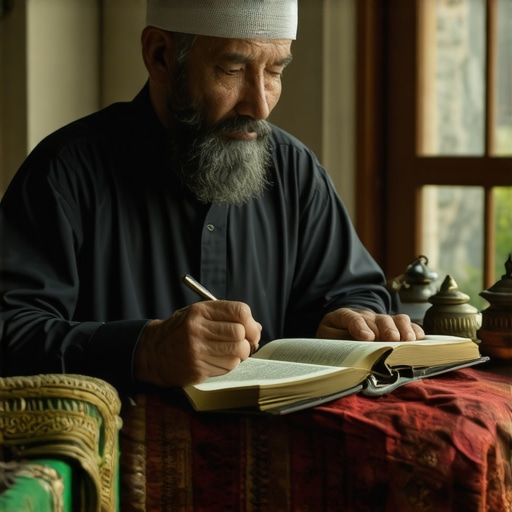My Personal Journey into the World of Islamic Dream Interpretation
Ever since I was a young Muslim, I found myself fascinated by the dreams that appeared in my nightly visions. Over time, I realized that these dreams were more than mere subconscious images; they held sacred messages and divine guidance. My journey led me to explore the teachings of Ibn al Qayyim, a renowned Islamic scholar whose insights on dreams have profoundly shaped my understanding of spiritual symbolism.
Understanding Dreams Through the Eyes of Ibn al Qayyim
Ibn al Qayyim emphasized that dreams are a window into the spiritual realm, offering messages from Allah and reflections of our inner selves. His writings, especially in his detailed treatise on dreams, reveal that interpreting these visions requires sincerity, piety, and a deep understanding of Islamic symbols. I recall a dream where I saw a clear stream, which, according to his guidance, symbolized spiritual purity and divine blessings—an insight that encouraged me to strengthen my faith.
Why Dreams Are Sacred and How They Guide Us
For me, dreams have become a sacred tool for divine communication. Ibn al Qayyim’s perspective helped me recognize that dreams of animals, for example, often symbolize different traits or messages—like a lion representing strength or a snake warning against deception. Exploring the Islamic dream dictionary deepened my understanding of these symbols, making my dream interpretations more meaningful and accurate.
How Can We Distinguish Between True and False Dreams?
This question often crosses my mind, especially when I wake up confused after a vivid dream. Ibn al Qayyim advises that true dreams are accompanied by a sense of calm and clarity, whereas false dreams might leave us anxious or unsettled. It’s also essential to seek divine guidance through prayer, as mentioned in this insightful article. Sharing my experiences, I encourage fellow believers to trust their intuition, seek knowledge, and always pray for divine clarity.
If you’re curious to learn more or need assistance interpreting your dreams, I recommend reaching out to knowledgeable scholars or trusted sources. Feel free to share your dreams or insights in the comments—I’d love to hear your spiritual journey.
Deciphering the Sacred Language of Dreams in Islam
Dreams in Islam are often considered divine messages, filled with symbolic meanings that require careful interpretation. As a seasoned scholar in Islamic dream analysis, I emphasize that understanding dreams involves recognizing the spiritual context and the personal circumstances of the dreamer. For instance, a dream about water might symbolize purity and divine mercy, but it could also reflect emotional cleansing or spiritual renewal, depending on the context. To deepen your knowledge, exploring trusted sources like the Islamic dream dictionary can be invaluable for accurate interpretation.
The Nuance of Symbols: From Animals to Sacred Places
Symbols play a crucial role in Islamic dreams. Animals, for example, are often seen as messengers of divine qualities or warnings. A lion might represent strength and bravery, while a snake could warn against deception or evil. Sacred sites, such as the Kaaba or mosques, often symbolize spiritual closeness to Allah or divine guidance. Recognizing these symbols’ layered meanings requires not only knowledge but also spiritual sensitivity. For more nuanced insights, I recommend studying works like Prophetic Dreams in Islam.
What Are the Practical Steps to Validate and Act on Dream Messages?
Interpreting dreams isn’t solely about deciphering symbols; it’s also about applying practical steps to ensure the messages align with Islamic ethics and divine guidance. First, always seek clarity through prayer, asking Allah for understanding and sincerity. Second, consult knowledgeable scholars or trusted Islamic texts to verify interpretations. Third, reflect on how the dream’s message can positively influence your actions and spiritual growth. These steps help differentiate between true divine messages and fleeting visions or illusions. Incorporating these practices can turn dream interpretation into a meaningful spiritual tool rather than mere speculation.
To further enhance your understanding, consider reading about dreams about loss and gain and their practical implications in life. Also, sharing your dreams with a trusted spiritual guide can provide additional insights and reassurance. If you’re interested in exploring more about sacred symbols and divine messages, I invite you to comment below or share this article with fellow believers who seek deeper spiritual understanding.
< }
}
Deepening My Understanding of Sacred Symbols in Dreams
As I continued my journey into Islamic dream interpretation, I began to realize that each dream is like a unique puzzle piece in the grand mosaic of our spiritual lives. Ibn al Qayyim’s teachings illuminated that symbols such as water, fire, or even colors carry layered meanings, often requiring us to consider the context of the dream and our personal circumstances. For instance, dreaming of water might signify purity and divine mercy, but in a different context, it could reflect emotional cleansing or spiritual renewal, as I learned from exploring dreams of conflict. The key lies in sensitivity and sincerity when interpreting these signs.
Reflections on the Ethical Dimensions of Dream Interpretation
One profound aspect that I’ve grappled with is the ethical responsibility entailed in dream interpretation. It’s tempting to jump to conclusions or offer quick explanations, but Islamic ethics call for humility and sincerity. Ibn al Qayyim advises that true understanding comes through prayer, patience, and seeking divine guidance—reminding me of the importance of approaching dreams with piety and care. This ethical stance prevents misinterpretation that might lead to unnecessary worry or misguidance, emphasizing that dreams should serve as tools for spiritual growth rather than sources of anxiety. For those interested, I recommend reading this comprehensive guide for a balanced approach.
How Can We Cultivate Our Ability to Recognize Divine Messages?
Practicing mindfulness and piety are crucial to sharpening our perception of divine messages in dreams. I’ve found that maintaining a sincere heart, regularly praying, and engaging with the Qur’an help create a receptive spiritual state. Moreover, reflecting on previous dreams and their interpretations fosters a deeper understanding over time. The more I engaged in this practice, the more I noticed subtle signs and symbols revealing themselves with clarity. According to this article, consistent prayer and supplication serve as keys to unlocking divine insights. I encourage fellow believers to share their experiences and insights—each story enriches our collective understanding and brings us closer to recognizing Allah’s divine communication in our dreams.
Embracing the Complexity of Dream Symbols and Personal Context
One of the most rewarding yet challenging aspects has been appreciating that symbols are deeply personal and multifaceted. For example, dreaming of a snake could symbolize danger, but it might also represent spiritual tests or hidden blessings, depending on the dreamer’s life situation. This complexity calls for a nuanced approach—one that considers personal circumstances, emotional states, and spiritual levels. I’ve learned that consulting trusted scholars or detailed resources like the Islamic dream dictionary helps refine this process, but ultimately, sincerity and humility in seeking divine guidance make the difference. If you’ve experienced such layered symbols, I invite you to share your insights or ask questions—our collective wisdom can illuminate the path for others.
Encouraging Personal Exploration and Continued Learning
My journey into dream interpretation is ongoing, and I remain curious about the subtle messages Allah sends through our visions. I see this pursuit as a form of spiritual self-discovery—an opportunity to deepen my faith and understanding of divine will. Whether through prayer, studying sacred texts, or consulting knowledgeable scholars, each step enriches my spiritual life. I encourage you, dear reader, to approach your dreams with sincerity and patience. Explore trusted sources, reflect deeply, and seek divine guidance in your interpretations. Remember, every dream is a sacred message, waiting to be understood and appreciated as part of Allah’s majestic communication with His servants. For further guidance, I recommend exploring Prophetic Dreams in Islam. Feel free to share your experiences or questions—I would love to hear how your journey unfolds and how you are learning to decode the divine language of dreams.
Unveiling the Layers of Divine Communication in Dreams
As I delved deeper into the realm of Islamic dream interpretation, I discovered that the symbols we encounter are often multi-layered, serving as gateways to profound spiritual truths. Ibn al Qayyim’s teachings emphasize that dreams are not merely personal reflections but are intertwined with divine wisdom, requiring meticulous discernment and a sincere heart. For instance, a dream about water might symbolize divine mercy, spiritual purification, or emotional cleansing, depending on the context and the dreamer’s spiritual state. Recognizing these nuances demands a blend of scholarly knowledge and intuitive sensitivity, often cultivated through dedicated reflection and prayer.
How Can We Differentiate Between Divine Messages and Personal Impressions?
This question has challenged me throughout my journey. True divine messages typically evoke a sense of calm and clarity, aligning with Islamic principles and encouraging righteous actions. Conversely, personal impressions or subconscious fears may produce confusion or anxiety. To navigate this delicate terrain, I rely heavily on prayer, particularly praying for divine guidance, and consulting authentic scholarly sources. Engaging with trusted dream dictionaries and seeking counsel from knowledgeable scholars help me refine my interpretative skills, ensuring that I do not mistake fleeting thoughts for divine revelations. This disciplined approach safeguards the sanctity and accuracy of dream interpretation.
The Role of Sacred Symbols in Deepening Spiritual Awareness
Sacred symbols such as the Kaaba, the Prophet’s mosque, or even specific animals carry layered meanings that extend beyond their surface representations. For example, dreaming of the Kaaba might symbolize divine proximity and spiritual fulfillment, but it could also signify a spiritual journey or a call for renewed devotion. My personal experiences have shown that these symbols often require contextual analysis, considering the dreamer’s current spiritual state and life circumstances. Studying authoritative texts like Prophetic Dreams in Islam provides invaluable insights into these layered meanings, enriching my understanding and guiding my reflections.
Can Advanced Dream Symbols Reveal Hidden Opportunities or Divine Guidance?
Indeed, the most profound aspect of Islamic dream interpretation lies in recognizing symbols that signal hidden opportunities or divine guidance. For example, dreaming of a key might represent unlocking spiritual or worldly doors, while a rising sun could symbolize divine enlightenment or new beginnings. To harness these symbols effectively, one must cultivate a receptive state of piety, mindfulness, and gratitude. Regularly engaging in prayer and Qur’anic reflection enhances one’s sensitivity to these divine cues, as highlighted in this detailed exploration. I encourage fellow believers to remain attentive to their dreams, journal their visions, and seek interpretation from trusted sources, as these messages can serve as powerful catalysts for personal and spiritual growth.
What Practical Steps Can We Take to Validate and Act Upon Sacred Dream Messages?
Validating and acting on dream messages requires a disciplined approach rooted in Islamic ethics. First, always seek divine clarity through prayer, asking Allah to confirm the authenticity of the message. Second, consult knowledgeable scholars or trusted dream dictionaries to ensure accurate interpretation. Third, reflect on how the message aligns with your current spiritual responsibilities and moral values before acting upon it. This cautious yet open-minded approach prevents misguidance and ensures that the dream serves as a genuine conduit for divine wisdom. Incorporating these steps into your spiritual practice transforms dream interpretation from mere speculation into a meaningful act of worship and self-discovery. I invite you to share your experiences or reach out for personalized guidance through our contact page. Your journey into the sacred language of dreams is a continuous process of learning and divine connection, and I am eager to hear your insights and questions.
Things I Wish I Knew Earlier (or You Might Find Surprising)
1. Dreams Are Personal Symbols with Deep Layers
When I first started exploring Islamic dream interpretation, I underestimated how personal symbols could be. A snake, for example, might mean danger for one person but spiritual testing for another. Recognizing these nuances has taught me to approach each dream with humility and patience, understanding that divine messages are often layered and context-dependent.
2. The Heart’s Calm Is Key to True Dreams
Initially, I thought vividness equated to divine importance, but I learned that true, meaningful dreams often come with a sense of peace and clarity. False or confusing dreams tend to leave us restless. This insight has helped me to discern which dreams merit reflection and which to set aside.
3. Prayer Is Essential Before and After Dream Interpretation
In my early days, I overlooked the power of prayer in clarifying dream meanings. Praying for divine guidance before sleeping and after waking up has become a vital part of my spiritual practice, ensuring that I interpret dreams with sincerity and align them with Islamic principles.
4. Consulting Trusted Sources Enhances Accuracy
Relying solely on intuition led me astray at times. Over time, I discovered the value of consulting authentic Islamic dream dictionaries and scholars. Resources like this guide have been invaluable in deepening my understanding and avoiding misinterpretations.
5. Dreams Can Signal Opportunities and Divine Guidance
I was surprised to find that dreams often serve as messages about upcoming opportunities or spiritual directions. Learning to recognize symbols like keys or the rising sun has opened my eyes to divine guidance in everyday life, encouraging me to remain attentive and grateful.
6. Ethical and Sincere Approach Is Crucial
Initially, I sometimes shared dreams without considering the ethical implications. Now I understand that dream interpretation should be handled with humility, seeking Allah’s guidance and respecting the privacy of others, aligning with Islamic ethics.
Resources I’ve Come to Trust Over Time
- Islamic Dream Dictionary by Ibn Sirin: An essential resource that has helped me understand common symbols and their meanings, deepening my interpretation skills.
- Prophetic Dreams in Islam: This book offers insights into how dreams can carry divine messages, which I highly recommend for anyone exploring sacred dream symbolism.
- Understanding Prayer in Dreams – Islamic Perspective: An article that emphasizes the importance of prayer for clarity and divine guidance, enriching my spiritual approach to dream interpretation.
- Online Islamic Scholar Consultations: Connecting with knowledgeable scholars has provided personalized guidance that I find invaluable in complex dream situations.
- Trusted Islamic Websites and Forums: Platforms like islamskisanovnik.net provide community support and scholarly articles that keep me grounded and informed.
Parting Thoughts from My Perspective
Reflecting on my journey into Islamic dream interpretation, I realize how vital sincerity, patience, and divine guidance are in uncovering the sacred messages hidden in our dreams. This practice has not only deepened my faith but also opened my eyes to Allah’s ongoing communication through symbols and visions. If this resonates with you, I’d love to hear your thoughts or experiences. Sharing our journeys can strengthen our collective understanding and help us all grow closer to Allah’s wisdom. Feel free to share this article with someone seeking to explore the sacred language of dreams, and remember, every dream carries a divine message waiting to be understood.




Reading about Ibn al Qayyim’s insights truly deepened my appreciation for the spiritual significance of dreams in Islam. I’ve often experienced vivid dreams that left me questioning whether they were divine messages or just subconscious reflections. Your emphasis on sincerity, prayer, and understanding Islamic symbols as guiding tools resonates with my own experiences. For instance, I once dreamed of water flowing abundantly, which I interpreted as divine mercy, and it encouraged me to increase my devotion. I find that maintaining a calm heart before sleeping and after waking up really helps in my interpretation process. I’d love to ask, how do you personally differentiate between dreams that carry divine messages and those influenced by personal fears or anxieties, especially when the symbols seem ambiguous? Are there specific prayers or supplications you recommend to strengthen this discernment? Engaging with knowledgeable scholars and trusted texts has been invaluable for me, and I believe sharing these experiences helps us all grow in understanding Allah’s communication through dreams.
Your reflection on the importance of sincerity and prayer in dream interpretation really resonated with me. I’ve found that cultivating patience and humility when analyzing dreams helps prevent misjudgments, especially when symbols are ambiguous. The guidance from Ibn al Qayyim and other scholars has been invaluable, but I’ve also noticed that maintaining a quiet, focused mind before sleep enhances clarity in dreams. I’d like to share that I often pray Istikhara when I’m unsure about the message in a dream—asking Allah for guidance helps me discern whether the dream is a sign from Him. I’m curious, has anyone else tried specific supplications or spiritual practices to strengthen their ability to recognize divine messages amidst personal fears or anxieties? Moreover, do you think that the emotional state during sleep influences the kind of dreams we have and their interpretive clarity? I believe that ongoing mindfulness and regular remembrance of Allah cultivate receptivity, enabling us to better understand His messages through dreams.
Reading about Ibn al Qayyim’s perspective on dreams truly highlights the spiritual depth and complexity involved in interpretation. I’ve personally found that keeping a dream journal helps me identify recurring symbols and better understand their meanings in context. For example, I once saw a door opening in a dream, which I interpreted as an opportunity for spiritual growth. Over time, I noticed similar themes appeared during periods of reflection and prayer, confirming their divine significance. I agree with the emphasis on sincerity and prayer; in my experience, maintaining a calm and sincere heart before sleeping—coupled with regular supplication—greatly enhances the clarity and authenticity of dreams. Has anyone here experienced a shift in dream symbolism after increased spiritual practices or fasting? I would love to hear how daily routines influence dream messages and interpretation. Ultimately, understanding that dreams may carry layered messages encourages us to approach them with humility and gratitude, trusting that Allah communicates in ways best suited for our spiritual development.
It’s truly inspiring to see how Ibn al Qayyim’s teachings continue to guide us in understanding the divine messages within our dreams. In my own experience, I’ve learned that maintaining a sincere intention before sleep, coupled with consistent prayer, significantly enhances the clarity of dreams and helps distinguish between true divine messages and subconscious impressions. One practice I found beneficial is reciting Surah Al-Falaq and An-Nas before sleeping to seek protection from misleading dreams or distractions, which often helps preserve the purity of divine guidance. I also try to keep my heart humble and free from worldly worries, as anxiety can cloud the spiritual clarity needed for authentic interpretations. How do others here prepare themselves spiritually to receive genuine messages from Allah through dreams? Are there specific routines or duas that you have found particularly effective in strengthening this connection? Sharing these insights can undoubtedly help us all refine our understanding and devotion.